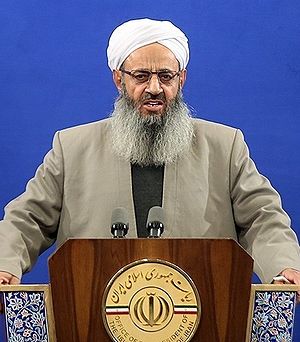Abdolhamid Ismaeelzahi
Abdolhamid | |
|---|---|
 Ismaeelzahi on 10 December 2016 | |
| Personal | |
| Born | Abdolhamid Ismaeelzahi c. 1946/1947 (age 76–78)[1] |
| Religion | Islam |
| Nationality | Iranian |
| Denomination | Sunni |
| Jurisprudence | Hanafi[2] |
| Creed | Maturidi |
| Muslim leader | |
| Website | http://abdolhamid.net/ |
Abdolhamid Ismaeelzahi (Persian: عبدالحمید اسماعیل زهی) is an Iranian Sunni Muslim cleric who is regarded as a "spiritual leader for Iran’s Sunni Muslim population", according to Reuters.[3] Ismaeelzahi enjoys support of the overwhelming majority of Baloch people in Iran, who hail him as their Molavi.[2]
He is the imam of the Makki Mosque in Zahedan[4] and the director of the Jamiah Darul Uloom Zahedan, the main seminary in the city.[5]
Views
Ismaeelzahi is a vocal critic of the status of freedom of religion in Iran and an advocate of nonviolence.[6] He has stated that capital punishment is "not suitable" and should be "used only when there are no other alternatives".[6]
On 2 August 2017, he sent a letter to Ali Khamenei addressing concerns over the “issue of religious discrimination in Iran”, which was publicly replied to.[7]
Travel restrictions
Ismaeelzahi is under alleged travel restrictions imposed by the establishment. In July 2014, he was barred from leaving the country.[1] In 2017, it was reported that the restriction was intensified, barring him from any travel except to Tehran.[8] However, in December 2018, he was allowed to visit Muscat, Oman to meet the Iranian Baluch minority living there.[9]
Accolades
- Defenders of Human Rights Center's Activist of the Year (2013)[10]
References
- ^ a b Philipp Breu, translated by John Bergeron, "Sunnis in Iran: The Zahedan network", Qantara, retrieved 15 November 2017
- ^ a b Ahmad Reza Taheri (2013), "The Sociopolitical Culture of Iranian Baloch Elites", Middle Eastern Studies, 46 (6): 973–994, doi:10.1080/00210862.2013.810079, S2CID 144860635
- ^ Bozorgmehr Sharafedin (6 August 2016), Sami Aboudi and Robin Pomeroy (ed.), "Iranian Sunni cleric says executions may inflame regional tensions", Reuters, retrieved 15 November 2017
- ^ Adelkhah, Fariba (2015). The Thousand and One Borders of Iran: Travel and Identity. Iranian Studies. Vol. 27. Routledge. p. 116. ISBN 978-1317418979.
- ^ Brigitte Maréchal; Sami Zemni, eds. (2013). The Dynamics of Sunni-Shia Relationships: Doctrine, Transnationalism, Intellectuals and the Media. Iranian Studies. Vol. 27. Hurst Publishers. p. 175. ISBN 9781849042178.
- ^ a b Behdad Bordbar (13 April 2014), "Iranian Sunni cleric says government asked for help to free soldiers", Al-Monitor, retrieved 15 November 2017
- ^ "Iranian Sunni leader voices concerns to Khamenei", Al-Monitor, 7 September 2017, retrieved 15 November 2017
- ^ "Iran's Sunni Leader Says Discrimination Is A Big 'Problem'", Radio Free Europe/Radio Liberty, 12 November 2017, retrieved 15 November 2017
- ^ @Khaaasteh (23 December 2018). "Iranian top Sunni cleric Abdulhamid, who was said to be banned from leaving Iran's Sistan and Baluchestan province…" (Tweet) – via Twitter.
- ^ "This week in human rights in Iran (December 18-January 8)", Majzooban, 2013, archived from the original on 16 November 2017, retrieved 15 November 2017
External links
- Pages using infobox religious biography with unsupported parameters
- Articles containing Persian-language text
- 1947 births
- Living people
- Deobandis
- Hanafi fiqh scholars
- International Union of Muslim Scholars members
- Iranian activists
- Iranian Islamic religious leaders
- Iranian Sunni Muslims
- Nonviolence advocates
- People from Zahedan
- 20th-century Muslim theologians
- 21st-century Muslim theologians